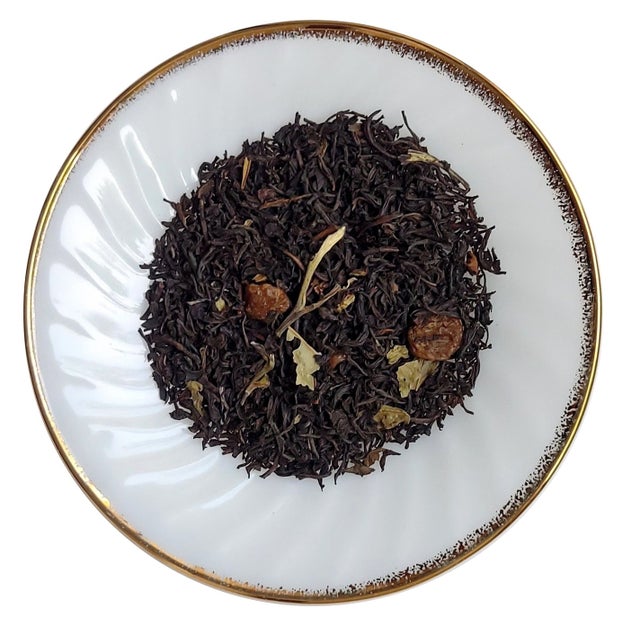- Flavored
- >
- Ice Wine Black Tea
Ice Wine Black Tea
SKU:
$1.25
1.25
29.25
$1.25 - $29.25
Unavailable
per item
Description
Beguiling sweet pear notes with hints of berry and caramel. To enhance the natural flavors, consumption with sugar is recommended.
Tell Me MoreIce wine, the nectar of winter. Or, should we say, nectar of the Gods? What else could you possibly call a drink that goes for upwards of $250,000 per 350 ml (11.8 oz)? That's the price you'd have to pay for an ultra rare bottle of Royal DeMaria, 2000 Chardonnay Ice wine. Most ice wines are priced well below that figure, but they still garner higher prices than traditional wines. Why? The grapes used to make the sweet dessert wine aren't pressed until they are frozen. As such, 1/5th the amount of grape juice is pressed from each frozen grape compared to the non-frozen variety. For vintners, a general rule of thumb is that each frozen grape will yield just one drop of ice wine. The flavor of the finished product is divine. Depending on the varietal, the nose can offer notes of peach, pear, honey, dried apricot and green apple. In the glass, the flavor is a sumptuous combination of apricot, peach, mango, melon and other sweet fruits. This fabulous black tea blend uses real ice wine to deliver all that fruity sweetness in a rich, round cuppa.
Who invented ice wine? No one really knows, but the Latin poet Marcus Valerius Martialis (AD 40-102) wrote that grapes should be left on the vine until they were stiff with frost. Evidently, he preferred the rich, sweet wines produced after November. |
Brewing for Best ResultsIdeal Brewing Temperature: 209°F/98°C.
Minimum Brewing Temperature: 190°F/87°C. Bring filtered or freshly drawn cold water to 209°F/ 98°C. Place 1 slightly heaping teaspoon of loose tea per 8 oz of fluid water. Steep 3-5 minutes according to taste (the longer the steeping time, the stronger the tea). Acceptable Pairing: Milk / Sweetener |
Origin
Tea(s) From: Sri Lanka, Kenya, India, China, and Canada Region(s): Nuwara Eliya, Dimbula, Uva, Nandi Highlands, Nilgiri, Fujian, and Ontario 98% Ethical Tea Partnership Reserved Collection ingredients
Luxury Ingredients: Black tea, Raisin pieces (sunflower oil, sulphites), White tea, Natural flavors (Organic Compliant), Ontario Icewine iced tea instructions
Per Serving: Bring filtered or freshly drawn cold water to 209°F/ 98°C. With and infuser, use 1 slightly heaping teaspoon of loose tea per 6-7 oz of fluid water. Steep 5 minutes. Add filtered hot tea to 16 oz glass filled with ice. (Some luxury teas will turn cloudy when poured over ice). Per Pitcher: Makes 1 Quart. Bring filtered or freshly drawn cold water to 209°F/ 98°C. Place 6 slightly heaping teaspoon of loose tea in a heat resistant container. Pour 1 ¼ cup of prepared water over the tea leaves. Steep 5 minutes. With a fine mesh sieve, filter the hot tea liquor to the serving pitcher filled with ice. Add cold filtered water to top off. (Some luxury teas will turn cloudy when poured over ice). brewing tips
Making an amazing cup of tea requires several things. High quality tea, filtered or freshly drawn cold water, correct water temperature, time of infusion, and filters/infusers. Unfiltered water or too hot of water can ruin the best of teas. Always use filtered or freshly drawn cold water. Any flavor from water treatments or heavy minerals such as lime or calcium can taint the water. Brew at the ideal temperature. Too hot of water can scorch the leaves and produce a bitter brew. If you find that the tea is still bitter following the recommended brewing temperature, try lowering the brew temperature another 5 to 10 degrees. Use infusers that allow the tea leaves to fully expand and has full contact with the water. Ditch the tea bags. Know the steeping time for your tea. Too long of steeping can make your tea bitter and undesirable. Too short of time will make a weak tea. Don’t make tea in the microwave. food safety
We strongly recommend using filtered or freshly drawn cold water brought to a rolling boil when brewing all types of tea. Today’s water has been known to carry viruses, parasites and bacteria. Boiling the water will kill these elements and reduce the potential incidence of water-borne illness. Cool the water to the ideal brewing temperature before brewing. |


